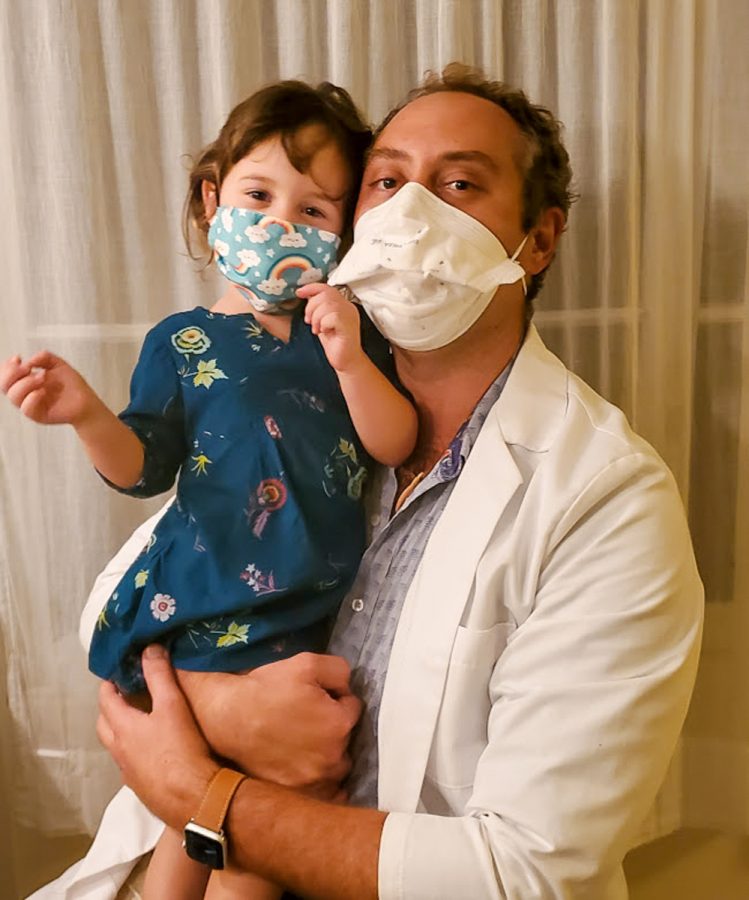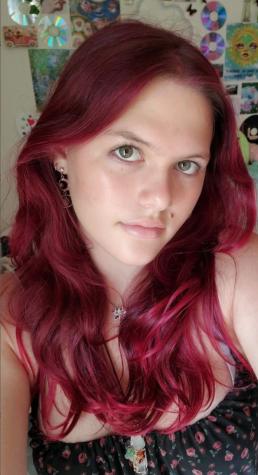A Hero With Heart
Dr. Richard Kline and his 2-year-old daughter, Julia, are pictured both wearing masks. Despite his wife’s doubts early on in the COVID-19 pandemic, Julia is actually “incredibly good” at wearing a mask. “I’ve taught her that if she sees people, she needs to wear a mask,” Dr. Kline said. Since last March, he has worked non-stop and credits his family as helping him get through these challenging times. Photo and caption by Lily Washburn.
February 18, 2021
Dr. Richard Kline starts his day at the hospital by gearing up in a gown, surgical cap, goggles, gloves, face shield, and N95 mask —equipment necessary to keep him safe from the deadly virus that has spread across the globe over the past year.
Dr. Kline is a hospitalist and the head of the COVID-19 team at the Pali Momi Medical Center. He is one of many front-line workers who continue to put their lives on the line every day in the fight to end this pandemic.
Dr. Kline has been working as a hospitalist, an in-patient physician who works exclusively in a hospital, at The Pali Momi Medical Center for the past four years. Recently, the demands of his job have increased substantially thanks to the rise of the COVID-19 pandemic.
“At the hospital, it has been incredibly more stressful because we are learning as we go,” Dr. Kline explained. “We’ve had to try to do treatments that are not written in any textbooks, that we never learned in medical school.”
Information on how to treat COVID-19 is extremely limited. At times, Dr. Kline and his colleagues rely only on their knowledge of human physiology and anatomy when treating the virus. In addition, they utilize the most recent data and research on the disease available to them.
Treating patients with COVID-19 comes with a load of challenges. Dr. Kline explained how the fear and stigma around the disease have made it emotionally difficult to manage.
“What’s hard is how scared family members are and patients are when they come in [to the hospital],” Dr. Kline said. “They feel as if they are pariahs; that no one wants to talk to them or touch them. They’re scared because they have this disease that has made the news that they think is going to kill them. And [they think] that there is no hope for them.”
COVID-19 is challenging to cope with because of its high infectious rate.
“In Hawaii and in many cultures, when somebody is sick, what helps you is family,” Dr. Kline said.
He explained that, in the past, when his patients were not doing well there have been up to 15 loved ones gathered around them in one hospital room for support.
“That is not able to happen, but family members want to be there just as much as they ever have,” Dr. Kline explained. “And with family members not able to be there every day for their loved one who is either possibly dying or possibly getting well but is at least scared, [it] is very very
tough.”
Extreme precautions must be taken to prevent hospital workers from catching COVID-19 from patients because the disease is highly contagious. Dr. Kline follows strict guidelines when visiting and treating COVID patients to keep from contracting the virus himself.
“I have to gown up and put on my PPE (Personal Protective Equipment) for every single one and then take it all off and wash my hands to the count of ABC, for a total of twenty seconds, and do the same thing back and forth,” Dr. Kline said, explaining that he has to repeat this process when visiting each of his patients.
Dr. Kline also mentioned that for safety reasons, he does not eat or drink for the entirety of his shifts.
“There have been incidents of people catching COVID from eating in the same room as coworkers,” he explained.
Fortunately, the hospital’s efforts to limit COVID-19 from spreading from patients to staff have been effective. A floor on the hospital designated for staff with COVID has not had one acquired infection yet, which Dr. Kline is “very proud of”.
Treating COVID patients is no light task, and sometimes the stress and emotional strain of the work is overwhelming.
“Trying to ease them and letting them know how important that emotional aspect of their lives is… and having the empathy to do that is something that I’ve gained a greater respect for,” Kline said.
Dr. Kline didn’t always envision himself in the place he is now. Initially, he studied at Thomas Jefferson Medical School and planned to obtain his doctorate in physiology.
“Although I really liked the teaching aspect, sitting in a room by myself for over 12 hours a day was not the best at all,” Dr. Kline said.
He didn’t enjoy the extensive research required and realized that this wasn’t the path for him. Dr. Kline wound up getting his master’s in education and taught high school biology, anatomy, and chemistry.
As he was teaching, Dr. Kline’s childhood best friend was studying to become a doctor. His friend often prodded him to quit teaching and pursue a career in medicine. Dr. Kline was eventually persuaded and ended up applying and being accepted to medical school at The Philadelphia College of Osteopathic Medicine. He received his Doctor of Osteopathic Medicine (DO), before going on to do his residency in family medicine.
Although his current job can be extremely demanding, Dr. Kline has found many ways to cope with this stress. His wife and two-and-a-half-year-old daughter, Julia, are the light in his life when things get dark at work.
“I get tremendous joy coming home and playing with my daughter; playing with her dolls and running around and dancing.” Dr. Kline exclaimed. “Tonight, we danced for about 45 minutes listening to jazz music in the background and she wanted to spin and spin and dance, which I absolutely loved.”
Dr. Kline’s wife, Adeline Kline, is “super supportive” of him and takes care of their daughter full-time when she’s not at preschool. Dr. Kline and his wife also started an exercise regimen early in the pandemic that they have been following every day to help with their mental and physical health.
“I really enjoy talking to my wife while working out about the stresses of my day,” Dr. Kline explained. “It kind of relieves my stress and also the exercise itself relieves the stress.”
Unfortunately, Dr. Kline’s work can sometimes interfere with his family life. Some days he doesn’t get home until 9 o’clock at night.
“And those nights I sometimes don’t even get to see my little girl, which makes it really hard,” he said.
His long shifts put an extra burden on his wife, who also happens to be pregnant.
There is a risk that Julia may have caught COVID from her father and is an asymptomatic carrier of the disease. To prevent further spread of COVID-19, her mother is the only one able to watch her when she’s not at pre-school. Although having to “single parent” is challenging, Mrs. Kline understands the importance of her husband’s work.
“One thing about being married to a person who works in medicine is you have to understand that a lot of times the job has to come first,” Mrs. Kline stated. “It doesn’t mean you are any less important to your partner, it just means there is someone who needs them more than you right now.”
Mr. and Mrs. Kline have found that communication is a vital tool in maintaining their relationship and their own well-being during these times.
“I think the most important thing we do is talk and take the time to listen,” Mrs. Kline explained. “We also recognize that both of us need breaks and to take time out to care for ourselves. It’s OK for him to come home and work out before jumping right into family life. And there are times when he comes home and I ask him to watch the child so I can run out and get some errands done without her or just take a walk alone.”
Working as a hospitalist amidst this pandemic has been a challenging yet eye-opening experience for Dr. Kline.
“There are times where it is very difficult and I cry,” Dr. Kline said. “And I’ve cried in front of patients, and I’ve cried with patients’ families when…bad things happen.”



